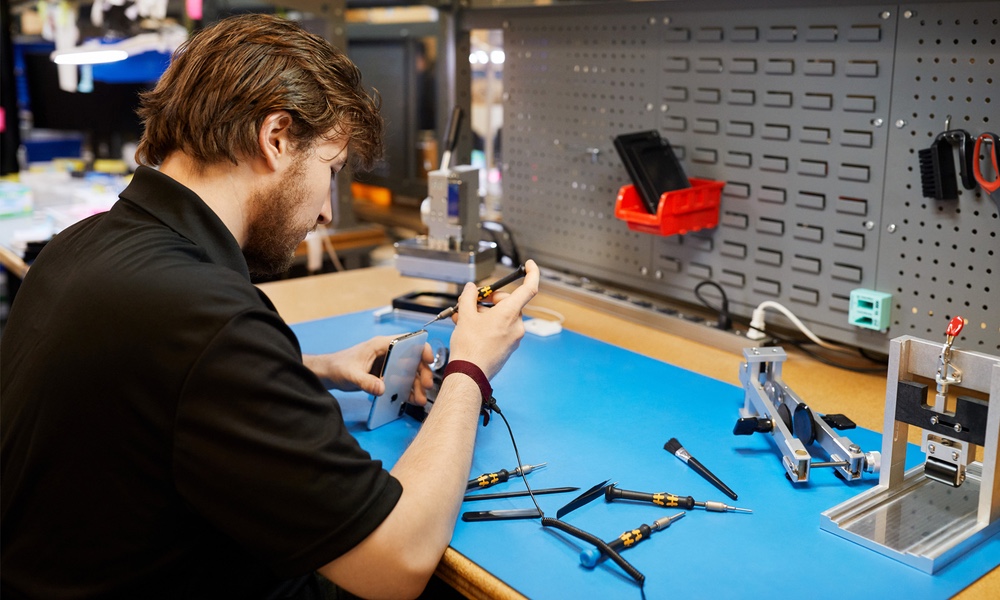Independent Repair Shops Can Now Officially Service iPhones
 Credit: Apple
Credit: Apple
Toggle Dark Mode
With so many U.S. states and other jurisdictions promoting “right to repair” legislation, there’s been a hue and cry over the past few years about how difficult it is to get proper, authorized repairs for Apple devices. Apple has been fighting legislation and continued to restrict its service parts and documentation to its own Apple Retail Stores and businesses that are accredited under the Apple Authorized Service Provider Program — a certification that’s not easy for many smaller repair shops to qualify for.
Apple’s insistence on only allowing repairs through these channels has often resulted in the company taking draconian measures to shut down small repair shops under the rationale that they’re using “counterfeit” Apple parts — another murky area since actual Apple parts do regularly surface on the gray market, although they’re often not labelled as such.
It now looks however like Apple is finally capitulating to the demand for more accessible repairs. We heard earlier this year that Apple was considering an “Apple Genuine Parts Repair” program, which would simply provide third-party and otherwise-unauthorized repair shops with access to legitimate Apple parts and repair resources. That program appeared to have quietly soft-launched with a few small repair firms being given access to “Apple diagnostic software, a wide variety of Apple repair parts, and repair training” with no restrictions on what types of repairs they would be permitted to do.
Apple has now officially launched this initiative as the Independent Repair Provider Program, forming another tier of providers that Apple will actually work with to allow “a variety of out-of-warranty iPhone repairs” including things like display and battery replacements.
Independent vs. Authorized Repair Providers
The main distinction between an Independent Repair Provider and an Apple Authorized Service Provider is that independent repair providers will only be permitted to perform out-of-warranty repairs on iPhones; in other words, they won’t be reimbursed by Apple for repairing devices that are under warranty, so users who have a warranty issue — or even an AppleCare+ damage claim — will still need to seek out an Apple Store or an Apple Authorized Service Provider.
Users with older phones, however, will likely find the program advantageous as smaller businesses may be able to offer more competitive prices, and of course may be more accessible in smaller communities, especially outside of the U.S.
Despite the earlier trial program, however, it appears that this new initiative will only be covering the most common out-of-warranty repairs, such as screen and glass replacements and battery swaps, and will also be limited to iPhone repairs only. Users needing legitimate repairs for other Apple devices will still need to seek out an Apple Retail Store or Apple Authorized Service Provider.
Easier for Small Shops
For businesses, the major advantage to Apple’s new policy is that it’s much easier to get approved as an Independent Repair Provider than it is to become an Apple Authorized Service Provider (AASP).
For example, to become an AASP, a company must be an established business that has already been in operation for “a reasonable period” of time, and must submit a fair bit of paperwork to Apple for review, including audited financial records. They must also qualify for a credit line with the Apple Finance team in the appropriate region, and are required to “actively promote” the Apple brand as part of their business. There are also a lot of other requirements that must be met, such as a layout of the business premises that should be “consistent with the Apple brand,” regular technician certifications, and administrative, logistical, and record-keeping requirements. Apple also regularly audits its Authorized Service Providers.
By contrast, companies applying to the Independent Repair Provider Program are simply required “to be an established business” with a commercial location (not a residential address), and to ensure that the technicians performing the repairs are certified by Apple through an online Authorized Testing Center. This makes for a much lower barrier to entry into this program, and although it will still exclude work-at-home freelancers, it should allow a lot of legitimate repair shops into the fold who previously had to resort to gray market parts and fights with Apple’s legal teams.
The program is only launching in the U.S. for now, although there’s no cost to apply to or join — other than the necessary technician training and the cost of the Apple parts and tools of course, which will be available to independent repair providers at the same cost as AASPs. Apple has said that it plans to expand the program to other countries — the pilot program ran in 20 businesses in North America, Europe, and Asia over the past year — although it’s unclear when businesses outside of the U.S. will be able to apply.






